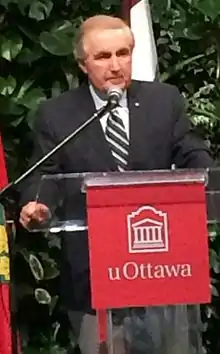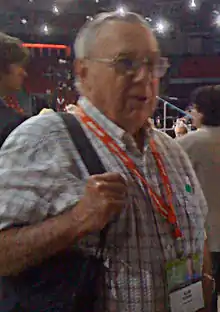Roy Romanow | |
|---|---|
 Romanow in 2015, at the University of Ottawa | |
| 12th Premier of Saskatchewan | |
| In office November 1, 1991 – February 8, 2001 | |
| Monarch | Elizabeth II |
| Lieutenant Governor | Sylvia Fedoruk Jack Wiebe Lynda Haverstock |
| Preceded by | Grant Devine |
| Succeeded by | Lorne Calvert |
| Chair of the Royal Commission on the Future of Health Care in Canada | |
| In office April 2001 – November 2002 | |
| Prime Minister | Jean Chrétien |
| Saskatchewan Leader of the Opposition | |
| In office November 7, 1987 – November 1, 1991 | |
| Preceded by | Allan Blakeney |
| Succeeded by | Grant Devine |
| 3rd Leader of the Saskatchewan New Democratic Party | |
| In office November 7, 1987 – January 27, 2001 | |
| Preceded by | Allan Blakeney |
| Succeeded by | Lorne Calvert |
| Deputy Premier of Saskatchewan | |
| In office June 30, 1971 – May 8, 1982 | |
| Premier | Allan Blakeney |
| Succeeded by | Eric Berntson |
| Saskatchewan Minister of Intergovernmental Affairs | |
| In office June 19, 1979 – May 8, 1982 | |
| Premier | Allan Blakeney |
| Preceded by | new office |
| Succeeded by | John Gary Lane |
| Attorney General of Saskatchewan | |
| In office June 30, 1971 – May 8, 1982 | |
| Premier | Allan Blakeney |
| Preceded by | Darrel Verner Heald |
| Succeeded by | John Gary Lane |
| Provincial Secretary of Saskatchewan | |
| In office June 30, 1971 – May 12, 1972 | |
| Premier | Allan Blakeney |
| Preceded by | Darrel Verner Heald |
| Succeeded by | Edwin Tchorzewski |
| Member of the Legislative Assembly of Saskatchewan | |
| In office October 11, 1967 – April 26, 1982 | |
| Preceded by | New Riding |
| Succeeded by | Jo-Ann Zazelenchuk |
| Constituency | Saskatoon Riversdale |
| In office October 20, 1986 – February 8, 2001 | |
| Preceded by | Jo-Ann Zazelenchuk |
| Succeeded by | Lorne Calvert |
| Constituency | Saskatoon Riversdale |
| Personal details | |
| Born | Roy John Romanow August 12, 1939 Saskatoon, Saskatchewan |
| Political party | New Democratic Party |
| Alma mater | University of Saskatchewan |
| Profession | Lawyer |
Roy John Romanow PC OC SOM KC (born August 12, 1939) is a Canadian politician who served as the 12th premier of Saskatchewan from 1991 to 2001.
Early life
Romanow was born in Saskatoon, Saskatchewan, to Tekla and Michael Romanow, who were Ukrainian immigrants from Ordiv, currently Chervonohrad Raion, Ukraine.[1] His first language as a child was Ukrainian.[2]
He studied at the University of Saskatchewan, earning a B.A. in Political Science and a LL.B. while involving himself heavily and early on in student politics.
Early political career
Electoral record
Romanow had considerable electoral success, being elected to the Legislative Assembly of Saskatchewan eight times in the nine general elections from 1967 to 1999, as a member of the Saskatchewan New Democratic Party.
He was first elected to the Legislative Assembly of Saskatchewan in the 1967 provincial election in the riding of Saskatoon Riversdale. He was re-elected in the general elections of 1971, 1975 and 1978. In the 1982 general election he was defeated by Jo-Ann Zazelenchuk, a 22-year-old retail employee, but easily defeated Zazelenchuk in a 1986 rematch, taking over 68 percent of the vote. He was re-elected in the general elections of 1991, 1995 and 1999. He resigned his seat in 2001.
Member of the Blakeney government
Romanow served in the cabinet of Premier Allan Blakeney from 1971 to 1982. At various times, Romanow served as deputy premier and Attorney General for Saskatchewan.
During the 1981 discussions over patriation of the Canadian constitution, the federal Minister of Justice, Jean Chrétien, the Ontario Attorney General, Roy McMurtry, and Romanow worked out the final details of Canada's new constitutional provisions, resulting in the famous late-night Kitchen Accord. Romanow objected strongly to any protections on private property in the new Canadian Charter of Rights and Freedoms, and none were included.
Leader of the Opposition
On November 7, 1987, Romanow replaced Allan Blakeney as leader of the Saskatchewan New Democratic Party and Leader of the Official Opposition. Romanow led the NDP to a landslide majority government victory in the 1991 provincial election, winning 55 out of 66 seats, and became premier of Saskatchewan.
Premier of Saskatchewan
Economic policy
Romanow's government was more conservative than previous NDP administrations, and was considered a practitioner of Third Way policies. Romanow, who inherited a $14 billion debt from the previous Conservative government,[3] eliminated the annual budgetary deficit by closing rural hospitals,[4] cutting services and raising taxes.[5] Romanow's government also had the benefit of substantially lower interest rates at a national level than did his predecessor in the 1980s. The Romanow NDP explained the cutbacks to the left wing of the party by claiming Romanow's range of political action was limited by the large debt accumulated by previous governments.
Re-elections
Romanow led the NDP to a second but slightly reduced majority in the 1995 provincial election.
In the 1999 provincial election, the NDP was re-elected to a third consecutive term, but was reduced to a minority of seats in the legislature. Romanow along with Saskatchewan Party leader Dwain Lingenfelter negotiated an agreement to form a coalition government with the Saskatchewan Liberal Party, appointing several Liberals to Cabinet. Romanow retired in 2001, and was replaced as leader of the NDP and Premier by Lorne Calvert.
Life after politics
Refusal to enter federal politics
The federal Liberals, and especially Jean Chrétien, had long tried to encourage Romanow to run federally as a Liberal, but he always refused.[6]
Federal Royal commission on the future of health care in Canada
On April 4, 2001, Romanow was appointed to head the Royal Commission on the Future of Health Care in Canada by Governor General Adrienne Clarkson, on the advice of Prime Minister Jean Chrétien. He released the Romanow Report in 2002, which outlined suggestions to improve the health care system.
Honours
On November 13, 2003 he was sworn in as a member of the Queen's Privy Council for Canada by Governor General Clarkson, again on the advice of Prime Minister Chrétien.
In 2003, he was made an Officer of the Order of Canada and was awarded the Saskatchewan Order of Merit. Romanow's official portrait was unveiled at Saskatchewan's Legislative Assembly in 2005, when he received the Commemorative Medal for the Centennial of Saskatchewan from Lieutenant Governor Lynda Haverstock.
Academic positions
- He served as the Chancellor of the University of Saskatchewan from 2016 to 2019.[7]
- He is a senior policy fellow in the College of Arts and Science at the University of Saskatchewan.
References
- ↑ J.L. Granatstein, "Roy Romanow", Canadian Encyclopedia, October 21, 2008 (updated by Danny Kucharsky, January 18, 2018).
- ↑ Gregory Marchildon, "Roy Romanow" in Gordon L. Barnhart (ed.), Saskatchewan Premiers of the Twentieth Century (Regina: University of Regina Press, 2004), p. 354.
- ↑ David Roberts, Romanow cuts spending, hikes taxes. Globe and Mail. p. A6. March 19, 1993.
- ↑ David Roberts, A radical prescription for health-care reform, Globe and Mail, pp. A1,A6, July 21, 1994.
- ↑ FCPP Publications :: Janice MacKinnon, Romanow's Finance Minister Archived September 27, 2007, at the Wayback Machine
- ↑ Greenspon, Edward (September 26, 2000). "Why Romanow rebuffed Chrétien". The Globe and Mail. Retrieved April 14, 2021.
- ↑ "USask chancellor to step down following completion of term". University of Saskatchewan News. Saskatoon. 2018-11-23. Retrieved 2022-03-01.
External links
- Article on Saskatchewan Order of Merit Appointment Archived 2005-11-03 at the Wayback Machine
